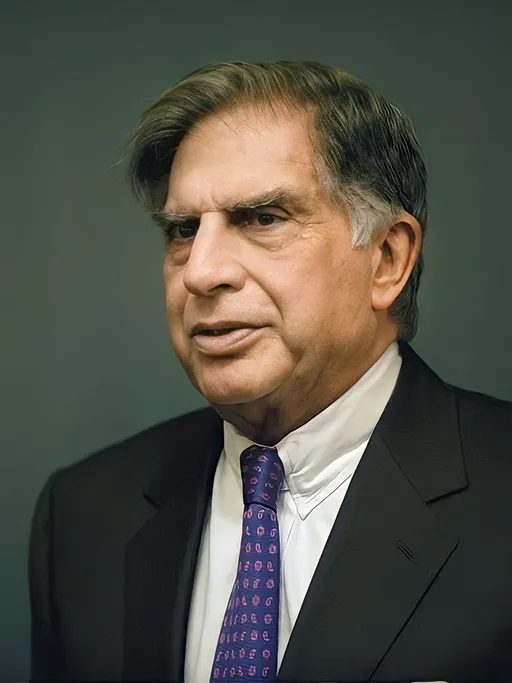There is a name, that speaks for innovation, leadership, and philanthropy, Ratan Tata is the name that had found a place in India’s most significant industrial epochs, glued to the records of modern Indian industrial history. Born on December 28, 1937, into one of India’s most influential business families, Ratan Tata’s life story finds an equal space in business acumen and dedication to social responsibility, integrity, and visionary leadership. This blog post discusses various aspects of Ratan Tata’s life and his journey through the Tata Group and notable contributions towards society.
Early Life and Education
Ratan Naval Tata was born to Naval Tata and Sonoo Tata at Mumbai. His lineage traces far back into the founding family of the Tata Group when his great-grandfather Jamsetji Tata first set up the group at the start of the 19th century. That notwithstanding, Ratan was not without his struggles during his childhood years. His parents were divorced when he was still a toddler, and he was sent to live with his grandmother who taught him values of hard work and perseverance.
He completed his elementary education at the Cathedral and John Connon School in Mumbai before coming to the United States for higher education. He pursued his B. Arch from Cornell University and then an MBA from Harvard Business School. Such global stints give him a global insight and a great foundation in the management of business ventures.
Joining the Tata Group
Ratan Tata was associated with Tata Group as an operative on the shop floor at Tata Steel, Jamshedpur, in 1961. This acquaintance helped him understand the nitty-gritty of manufacturing and the difficulties confronting the workforce. Appointed in 1971, he became the director and later chairman after J.R.D. Tata retired in 1991-an enormous change that would set the foundation for a new phase in the company’s history.
Under him, diversification and expansion took new dimensions when Tata Group ventured into new sectors of information technology, telecommunications, and hospitality. He envisioned Tata Group as a global player while being an unrelenting value follower of the founder. His mantras “What we do is not only for profit but also for betterment of society” served as guiding principles for the group.
Key Achievements
1. Tata Consultancy Services (TCS)
The biggest boast of Ratan Tata would be the exponential growth of Tata Consultancy Services (TCS). In his tenure, TCS emerged to become one of the leaders of global IT services companies by developing and offering innovative solutions and services to clients from various sectors. TCS placed Tata into the frame of technology and revolution in the digital world by making a good contribution to India’s IT boom.
2. Tata Motors and the Nano
But Ratan Tata still had in his mind an affordable public transport for the economy class and hence wanted an affordable car available for Indian families. And so, Tata Nano emerged. The car was launched in 2008, and then, there came the news announcing the world’s cheapest car. Although it did not quite turn out to be as commercially successful as envisioned, it did depict the innovation coming from Tata and the urge to satisfy the bottom of the pyramid needs.
3. Internationalization
This was perhaps the most aggressive phase of overseas expansion for the Tata Group under the banner of Ratan Tata’s tenure. Major acquisitions during his period were Jaguar and Land Rover in 2008, both British luxury car brands. Those buys rejuvenated those very high-value brands and constituted a pilot project by Tata to buy and rebrand international companies further.
This gave the group international status and, hence, increased its global presence.
4. Tata Steel Global Presence
Tata Steel was also one of the great companies in the world under the management of Ratan Tata. Among all acquisition by Tata Steel, one most significant acquisition is made in 2007, when Tata Steel entered the European market by acquiring Corus Group and increased its production manifold for achieving global scale.
Tata Steel was transformed into a global player under Ratan Tata based on strategic vision with an emphasis on sustainability and innovation in operations
Leadership Style
A perfect mix of humility, empathy, and a forward look, the leadership style of Ratan Tata is a great illustration of a cosmopolitan Indian chairman who had the distinction of being elected as the President by members at first instance. The management style was inclusive, and he would always preach on lines of “Example is the best teacher” and speak about ethics and integrity in business constantly. His commitment to welfare for employees and social responsibility set precedence in corporate governance.
Ratan Tata was also a consummate accessible personality, inculcating a culture of open communication within the Tata Group. He encouraged innovation and took all ideas in, often saying, “I don’t believe in taking right decisions. I take decisions and then make them right.” This philosophy empowered his team to take risks and drive change, fostering a culture of entrepreneurship within the organization.
Philanthropic Efforts
Apart from corporate success, Ratan Tata is known for philanthropy. He always believed in doing good by doing good. The Tata Trusts, holding a significant equity share of the Tata Group, have funded many initiatives toward social development in India.
SECTION Education and Healthcare
Ratan Tata within the Tata Trusts has one of the big backers of education and healthcare initiatives. He has spearheaded in the establishing institutions, including the Tata Institute of Social Sciences (TISS) and the Tata Memorial Hospital, supporting those who require that very service and education. Directly affecting the society, these institutions have concentrated on quality education and healthcare.
Rural Development
Tata has a number of rural development initiatives towards providing the better quality of life in rural settings. The Tata group has been affiliated with programs for sustainable agriculture, water conservation, and renewable energy among the rural communities so that they can grow and develop up to the optimum.
Disaster Relief
Ratan Tata was always punctual in his response to any situation arising out of crisis. He has led efforts in the wake of natural calamity and disasters, starting from the 2001 Gujarat earthquake to the 2014 Kashmir floods. In all such situations, his response embodies the spirit of compassion and humanity for human beings.
Retirement and Continuing Clout
Ratan Tata could not continue as chairperson of the Tata Group beyond 2012, but that was not due to a lack of innovation or social good heritage. Rather, he had not retired at all; instead, he kept working in his web of startups, philanthropy, and other pursuits. He remains today an active member of the boards of many entities and is fully involved with mentoring young entrepreneurs.
In addition to embracing innovation and technology in his retired phase, Ratan Tata has also invested in some startups particularly in technology and healthcare areas. In any case, the fact that these are mostly young entrepreneurial firms only reflects his confidence in the power of entrepreneurship for bringing about change.
Awards and Recognition
Business and Social Contributions. There is no one who remains unaware of the many accolades Ratan Tata has received so far. In 2008, he received Padma Bhushan and in 2014, he received Padma Vibhushan. Of these, two are India’s highest civilian awards. Not only was he acclaimed by the international and national scenario for his leadership and philanthropy but also gained a status as a role model for future leaders.
Ratan Tata’s legacy has the plurality because it does not only depict business success but absolute commitment to social responsibility and vision of a better India. In a life that seems inspiring enough for most, here lies evidence that success cannot be merely talked about in terms of money, but also encompasses the scope of difference-making.
The story of Ratan Tata, from a young boy with a dream to one of India’s most respected leaders today, is representative of vision, industrious work, and integrity that can pursue any dream. As the generations succeed him in following his dream, his life reminds us of what leadership is all about: the change he has had in the life of another.
Conclusion
Such is the saga of Ratan Tata-through stamina, innovation, and even sensitivity. This journey through the Tata Group not only transformed the organization but created a different paradigm for the industrial landscape of India. In retracing his outstanding contribution, it comes to my mind that true leadership is derived from the service to humanity to uplift society. Ratan Tata, as a human being, epitomizes this approach and his legacy will inspire generations to come.
one of the great line told by Ratan tata ji is – “None can destroy iron, but its own rust can! Likewise, none can destroy a person, but their own mindset can.”
Ratan tata’s official Instagram handle https://www.instagram.com/ratantata?igsh=azV5azk2N3RkOGdj
also visit https://en.wikipedia.org/wiki/Ratan_Tata
for more information visit https://knowledgekendra.com/remembering-ratan-tata-a-legacy-of-innovation-and-leadership/





Pingback: "The Journey of Ratan Tata: Transforming Dreams into Reality" - Knowledge kendra